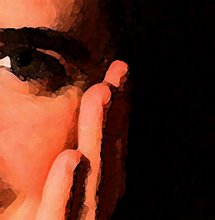Last night was Simchat Torah (happiness of Torah), the holiday that celebrates the conclusion of a year's worth of Torah reading. Tomorrow morning we begin again with Genesis. At my synagogue, we complete the entire scroll on a three year cycle, reading only 1/3 of each week's parsha (portion) in each of the three years. Like serialized stories that used to appear in magazines and newspapers, this method of reading keeps people in suspense and coming back for more...at least that is the idea.
Simchat Torah is a joyous affair. At my synagogue we unfurl the entire scroll; many people are enlisted to carefully hold it up and, when it's their turn, they read a synopsis of the parsha they happen to be holding. The first time I saw this done (and participated in the doing of it) I thought it was cool if not a bit wild (the Torah seemed to be naked and vulnerable, all spread out like that), but this year I felt a bit bored listening to the rather straightforward summaries of the chapters. Why not do it in limerick or haiku form? I might have to make that suggestion and, if accepted, I might have to create the limericks. Could be a fun project.
Once we'd symbolically read the entire Torah, it was rolled back up and, with other scrolls, paraded around the synagogue. Each parade is called a hakafa, and each hakafa was in honor of a certain group of people - e.g. board members, people who regularly read Torah on Saturdays, new members, etc.. And at some point the hakafot made their way outside and people were dancing on the sidewalk, accompanied by a lively klezmer band.
Like last year, I wasn't able to get into the dancing, and I didn't make myself try. It was one of those moments - and I have many of them - where I feel a distance from exuberant ritual, or I feel a need to set myself apart from everyone else. I hung back at the top of the steps of our synagogue, watching the action below and munching on some m&m's. At times like this I seem to retreat into an anthropologist persona, someone who is curious about and appreciates what is going on, but who isn't going to shed their reserve and jump into the fray.
After the seventh hakafa, we returned to the sanctuary and the service became more structured and formal. The rabbi called up three aliyot (an aliya is when someone is asked to come to the front of the sanctuary and recite the blessings before/after reading the Torah), starting with people who are descendants of the Cohanim, or priestly class of Jews, followed by an aliya for the Levites and then Israelites. I am the daughter of a cohen, through my father's side. In more traditional Jewish communities female offspring of cohanim don't receive any special privileges or perks, a fact which used to enrage my ego and (unjustified) sense of superiority when I was growing up. So, there I was, feeling disconnected from the festivities yet being invited to bless the Torah as a bat-cohen (daugher of a cohen) in a community that doesn't particularly care about such distinctions anyway. I hesitated a few seconds before joining the others at the front of the room, for the recognition I had always wanted. A few people held up a tallis (prayer shawl) over our heads as we recited the blessing, reading it from a laminated card with large print. The tall fellow next to me said, "Cohanim don't need the card," implying that as descendants of priests we should have memorized the prayers a long time ago.
Oy.
Returning to my seat, a few people shook my hand and uttered, "Yasher Ko-ach" (may your strength be firm), which is what you say to people who have participated in the synagogue service. (here's an interesting explanation of why we say these words). I felt strange accepting their salutations and wishes. My reluctant participation had not required any effort or skill or preparation.
I was, however, quite eager to try a homemade etrog (citron) liqueur that was being passed around in opaque shot glasses. The creator had grated the rind of three etrogim and steeped them in a few cups of vodka for several days before adding yet more vodka and sugar. The result was refreshing and delicious. Perhaps it could become a new holiday tradition, or a new holiday: Simchat vodka, anyone?
Friday, October 5, 2007
Subscribe to:
Post Comments (Atom)




2 comments:
I've often found it difficult to get into the dancing at religious events -- even at Elat Chayyim, where I generally feel safe and welcomed. I have some old insecurities about dancing in public, I suppose, and dancing during worship is challenging for me. I'm more comfortable with contemplative practices, although deep down I seem to crave joyful niggunim and riotous singing and drumming, so perhaps there's a part of me that wants to be up and dancing.
This year was the first time I really celebrated Simchat Torah fully. When one scroll was handed to me for a hakafah, I wound up waltzing it gently around the room, holding it like a beloved to my breast. It felt like the right thing for me to be doing -- I couldn't muster the ability to leap and throw myself and the Torah together into the air, but I didn't want to hang back the whole time and remain on the sidelines.
Anyway. This post resonates a lot for me. Obviously, since I've just left you a dissertation for a comment. :-)
Thanks, Rachel, for commenting. I had read your entry on Simchat Torah and felt a bit envious of your ability to get into the holiday in an appropriate way (jumping or leaping with the Torah seems a bit much!).
Post a Comment